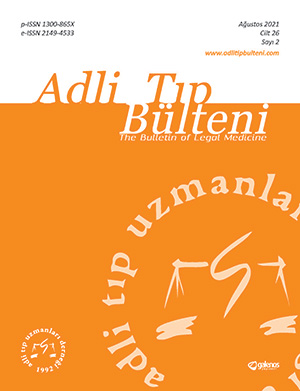Characteristics Properties of Autopsy Cases with Ethyl Alcohol and Evaluation of Their Causes of Death
DOI:
https://doi.org/10.17986/blm.1364Keywords:
Forensic medicine, autopsy, ethyl alcohol, cause of deathAbstract
Introduction: Ethyl alcohol intoxication and abuse take place in the world and in Turkey as an important public health problem. In this study, the data of cases with ethyl alcohol as a result of toxicological examination in autopsies were compared. The aim of this study was to determine the characteristics of autopsy cases with ethyl alcohol and to compare the causes of death.
Method: The results of all autopsies performed by “Muğla Forensic Medicine Institution” between 2013-2018 were evaluated retrospectively. When the alcohol detection rates were analyzed by years, it was shown that 42.2% of the autopsies performed in 2013 were found to be alcohol, while autopsies performed in 2018 were found to be 17.2% (P = 0.000). Alcohol was found in 15.8% of the autopsies performed in women and 28.8% in men (P = 0.000). The cause of death in 25.9% of the cases with alcohol was defined as a self-existing disease (heart, lung, brain, liver, stomach, etc.), whereas this rate was 34.6% in cases without alcohol. The causes of death due to penetrating traumas (firearms, stab wounds) were 13.9% in alcohol-detected cases and 9.1% in alcohol-free cases.
Discussion and Conclusion: It has been suggested that the differences in alcohol detection rates in autopsy cases may be related to awareness studies aimed at raising social awareness. It was suggested that the difference between alcohol detection and causes of death in autopsy cases could be related to alcohol use and increased frequency of depression / suicide risk.
References
Saukko P, Knight B. Knight’s Forensic Pathology. 4th Ed. CRC Press. Taylor and Francis Group, 2016.
Can Özgür. Alkol. Adli Tıp ve Adli Bilimler Kitabı. Sy:645-695. Dokgöz Halis (Ed). 1. Baskı. Akademisyen Kitabevi, 2019, Ankara.
Müsellim Turan N, Üzün İ, Gürpınar SS. Evaluation of death cases suspected of in toxication for legal and medical documents. Adli Tıp Bülteni. 2002;7(3):92–6. https://doi.org/10.17986/blm.200273482.
Sorock GS, Chen LH, Gonzalgo SR, Baker SP. Alcohol-drinking history and fatal injury in older adults. Alcohol. 2006;40(3):193–9.
Ege B, Yemişçigil A, Aktaş EÖ, Koçak A. İzmir’de 1990-1994 Yılları Arasında Otopsisi Yapılan Olguların İncelenmesi. Adli Tıp Bülteni. 1997;2(2):58–61. https://doi.org/10.17986/blm.199722225
Almeida-González M, Luzardo OP, Boada LD, Zaragoza E, Meilán MJ, Zumbado M, et al. Ethanol levels in legally autopsied subjects (2016–2017): Update of data and epidemiological implications in relation to violent deaths in Canary Islands (Spain). J Forensic Leg Med. 2019;68101868. https://doi.org/10.1016/j.jflm.2019.101868.
Kadı G, Çekiç EG, Erbaş M, Balcı Y. Otopsisi Yapılan Olgularda Etil Alkol Düzeyinin Değerlendirilmesi. Muğla Sıtkı Koçman Üniversitesi Tıp Derg. 2017;1;3(3):1-4.
Auckloo MBKM, Davies BB. Post-mortem toxicology in violent fatalities in Cape Town, South Africa: A preliminary investigation. J Forensic Leg Med. 2019;6318–25. https://doi.org/10.1016/j.jflm.2019.02.005
Posey D, Mozayani A. The estimation of blood alcohol concentration. Forensic science, medicine, and pathology. 2007 Mar 1;3(1):33-9. https://doi.org/10.1385/FSMP:3:1:33
Kelly AT, Mozayani A. An overview of alcohol testing and interpretation in the 21st century. Journal of pharmacy practice. 2012 Feb;25(1):30-6. https://doi.org/10.1177/0897190011431149
de Lima IV, Midio AF. Origin of blood ethanol in decomposed bodies. Forensic Sci Int. 1999;20;106(3):157-62. https://doi.org/10.1016/S0379-0738(99)00150-4.
Takayasu T, Ohshima T, Tanaka N, Maeda H, Kondo T, Nishigami J, Ohtsuji M, Nagano T. Experimental studies on postmortem diffusion of ethanol-d6 using rats. Forensic Sci Int. 1995; 29;76(3):179-88. https://doi.org/10.1016/0379-0738(95)01820-4.
Anzillotti L, Marezza F, Calò L, Cucurachi N, Veronesi L, Cecchi R. Toxicological findings: A retrospective overview of medico-legal investigations in Parma (Italy). J Forensic Leg Med [Internet]. 2019;62(April 2018):92–6. Available from: https://doi.org/10.1016/j.jflm.2019.01.011
Kugelberg FC, Jones AW. Interpreting results of ethanol analysis in postmortem specimens: A review of the literature. Forensic Sci Int. 2007;165(1):10–29. https://doi.org/10.1016/j.forsciint.2006.05.004
Grant SA, Millar K, Kenny GN. Blood alcohol concentration and psychomotor effects. British J Anaesthesia. 2000 1;85(3):401-6. https://doi.org/10.1093/bja/85.3.401
Pierce DR, West JR. Blood alcohol concentration: a critical factor for producing fetal alcohol effects. Alcohol. 1986;1;3(4):269-72. https://doi.org/10.1016/0741-8329(86)90036-4
Durmaz Ü. Kan alkol düzeyi bakılan trafik kazası olgularının adli tıp açısından irdelenmesi. Adli Tıp Bitirme Tezi. Diyarbakır, 2018. Erişim: http://hdl.handle.net/11468/4670.
Dilbaz N, Aytekin Y. Suicide ideation, behavior and suicide intent of alcohodependent patients. Bağımlılık Derg. 2003;4(1):1-9.
Batıgün AD. Duygudurum bozuklukları, şizofreni ve alkol/madde bağımlılığında intihar. Türk Psikoloji Dergisi 1999; 2:43- 72. 56.
Türkmen N, Fedakar R Etün V, Durak D. The role of alcohol in deaths due to stab wound injuries. Adli Tıp Bülteni. 2004;7(2):45–50. https://doi.org/10.17986/blm.200272474
Downloads
Published
Issue
Section
License
Copyright (c) 2021 The Bulletin of Legal Medicine

This work is licensed under a Creative Commons Attribution 4.0 International License.
The Journal and content of this website is licensed under the terms of the Creative Commons Attribution (CC BY) License. The Creative Commons Attribution License (CC BY) allows users to copy, distribute and transmit an article, adapt the article and make commercial use of the article. The CC BY license permits commercial and non-commercial re-use of an open access article, as long as the author is properly attributed.

